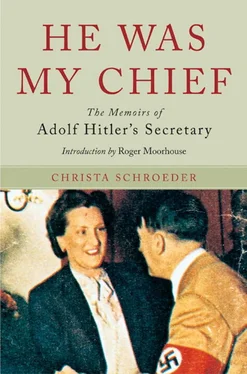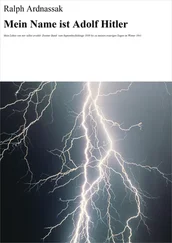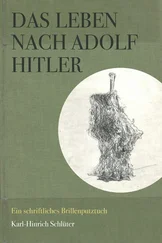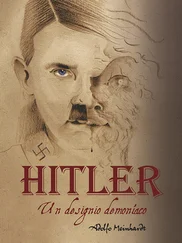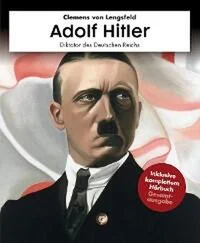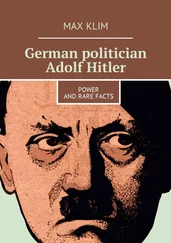Christa Schroeder - He Was My Chief - The Memoirs of Adolf Hitler's Secretary
Здесь есть возможность читать онлайн «Christa Schroeder - He Was My Chief - The Memoirs of Adolf Hitler's Secretary» весь текст электронной книги совершенно бесплатно (целиком полную версию без сокращений). В некоторых случаях можно слушать аудио, скачать через торрент в формате fb2 и присутствует краткое содержание. Город: Barnsley, Год выпуска: 2012, ISBN: 2012, Издательство: Frontline Books, Жанр: История, Биографии и Мемуары, на английском языке. Описание произведения, (предисловие) а так же отзывы посетителей доступны на портале библиотеки ЛибКат.
- Название:He Was My Chief: The Memoirs of Adolf Hitler's Secretary
- Автор:
- Издательство:Frontline Books
- Жанр:
- Год:2012
- Город:Barnsley
- ISBN:978-1-7830-3064-4
- Рейтинг книги:4 / 5. Голосов: 1
-
Избранное:Добавить в избранное
- Отзывы:
-
Ваша оценка:
- 80
- 1
- 2
- 3
- 4
- 5
He Was My Chief: The Memoirs of Adolf Hitler's Secretary: краткое содержание, описание и аннотация
Предлагаем к чтению аннотацию, описание, краткое содержание или предисловие (зависит от того, что написал сам автор книги «He Was My Chief: The Memoirs of Adolf Hitler's Secretary»). Если вы не нашли необходимую информацию о книге — напишите в комментариях, мы постараемся отыскать её.
He Was My Chief: The Memoirs of Adolf Hitler's Secretary — читать онлайн бесплатно полную книгу (весь текст) целиком
Ниже представлен текст книги, разбитый по страницам. Система сохранения места последней прочитанной страницы, позволяет с удобством читать онлайн бесплатно книгу «He Was My Chief: The Memoirs of Adolf Hitler's Secretary», без необходимости каждый раз заново искать на чём Вы остановились. Поставьте закладку, и сможете в любой момент перейти на страницу, на которой закончили чтение.
Интервал:
Закладка:
In the city there is a theatre dating from the Tsarist era, naturally terribly neglected with woodworm in the ceiling, and it is just a question of when it will fall in, tomorrow or in a hundred years. The experts are unable to be precise. As it weighs seventy tonnes, it will be a notable event. The performers make the best of what they have at their disposal. The orchestra plays cleanly, the ballet is grandiose in parts. The ballet master and prima donna could perform in Berlin and receive rapturous applause. They are outstanding in their own field. The pair does a Mongolian dance which brings their racial origins to the fore in the mime, a crass characterisation of the Asiatics. They cannot waltz; it is a ghastly hopping affair which they should drop. It is interesting that every opera house has a large installation for ballet.
I saw La Traviata and Faust . These were not a success. The actors are like wax figures, the men with fixed expressions and mechanical gestures making them appear wire-operated. Perhaps it is the training. Most of the voices are outstanding. The costumes (e.g. in La Traviata ) are a cross-section from the twentieth century: short, three-quarter length, fringed (like we had in the 1920◦– 24 period), long and patchwork. The honest presentation allows all these defects to be overlooked, and in a way one finds it enthralling.
I got to know the German city and regional commissars at the beginning of our stay and had the chance to see a few things, e.g. I took part in a tour of various collective farms. It was a glorious day. We started off at 0800, breakfasted with a district farmers’ leader who lives by the inland sea ninety minutes away. There was German rump steak, scrambled egg and cooked cheese, washed down with a glorious egg liqueur. Then we did the tour. The fields needed a lot of initial work because the Bolsheviks never spread manure. It will take much toil until the yield reaches the hoped-for targets. I love the countryside here very much; it makes me feel at home somehow. The fields are so beautiful with black wheat in bloom, sunflowers, the red and pink poppies were wonderful but have now started to seed. Soya bean growing has failed so far, it does not ripen; the Bulgarian variety, which ripens six weeks earlier, has now been introduced.
Our people immigrating here do not have an easy task, but there are many possibilities to achieve great things. The longer one spends in this immense region and recognises the enormous opportunity for development, the more the question presents itself as to who will be carrying through these great projects in the future. One comes to the conclusion that the foreign people [80] Foreign people = Fremdvolk , i.e. presumably the settled inhabitants of the Ukraine before the Nazis arrived. (TN)
are not suitable for various reasons, and ultimately because in the course of the generations an admixture of blood between the controlling strata, the German element and the foreign people would occur. That would be a cardinal breach of our understanding of the need to preserve our Nordic racial inheritance and our future would then take a similar course to that of, for example, the Roman Empire. Everybody who takes a closer look at things comes to the conclusion that the achievements of our people after the war is won, and their territorial gains, must be at least as large as during the war, and therefore our generation will not be able to sit back and relax.
Now I have gone wandering off track again, and so back to the district farmers’ leader, an extremely well-fed Schleswig-Holsteiner who has kept the business in wonderful order. After lunch we toured one of the giant sugar factories destroyed by the Bolsheviks, then coffee and doughnuts were followed by a visit to the inland sea. It was a cheery event! I, the only female, and therefore the hen in the basket! It did me really good. In the evening the table almost sagged under the weight of the plates, and we laughed ourselves silly at the stories the regional commissar, a very sharp fellow, told us.
We received invitations to visit the city commissar. He lives in a former convalescent home for children. The house is a ruin, the wild garden romantic (I just loved it, I am not so keen on circular paths and borders), and it is situated on a small mountain (the infantry have named it ‘Obersalzberg’). It offers a really entrancing view of the city in the distance and over a fairly broad river which winds through hilly meadows and woods and reminds me of the Weser. In the evening we sat at a long table in the garden by candlelight, which was quite romantic except there were too many people there. I am beginning to favour smaller circles where people can get to know each other.
The district commissar has just rung me with his praises, saying that everybody on the collective farm tour found me inspiring and I should come alone next time too!
I think that this letter has gone on too long for you, but now that the mood has caught me I will tell you a little more.
In the evening we often walk to the nearest village where the children always look out for us. They are strikingly beautiful, mostly blond and blue eyed. I have a soldier’s dictionary and try to make myself understood. The others laugh at me but I succeed. Anyway, it gives us a lot of fun. Most of the old men from the Tsarist time have fine heads and are very polite. The women and young men have had Bolshevism hammered into them and I should not like to run into them alone on a dark night. The unmade streets are miserable: after rain, like soap in which one’s vehicle bogs down; when dry, like encrusted lava over which the vehicle rocks and shakes. From afar the houses look quite enchanting, white with a thatched roof, the interiors simple. That’s enough about the land and people…
As already mentioned, in the early phase of the Russian campaign Hitler was nearly always in good humour and not averse to the odd joke. When the bitter winter of 1941 halted the advance, this affected his demeanour. Personally I was suffering very much from the constant inactivity and was glad whenever Dr Brandt, who had a substantial correspondence as president for hospitals and health, gave me a few hours’ work. The longer the Russian campaign lasted with its to-ing and fro-ing, the more FHQ Wolfsschanze began to be more permanently equipped. Gradually along came a cinema and tea-house, and gradually life began to be more acceptable for us there.
Unfortunately I had not been able to convince the boss that he only needed one secretary. I was anxious to do useful work elsewhere, but he would not release me. This enforced indolence, this eternal monotony and the repetitive daily tea hours, all made me aggressive. I rebelled inwardly and then something happened one evening at tea which exposed this aggression to everybody.
The day had been as dull as any other. After dinner I saw a film in the hope of relieving my boredom, then I went to the officers’ mess from where Hitler’s manservant winkled me out just as I was getting comfortable. In the hope that the tea session would perhaps not last too long, I promised to return to the mess afterwards. Torn from a convivial environment, I now came to a Führer who wore a frown. I knew that he would be in a bad mood, for the situation at the Front was not good. Today’s theme was that old chestnut, smoking. He would start out with special reference to narrowing of the arteries caused by smoking. How awful a smoker’s stomach must look. Smokers lacked consideration for others, forcing them to breathe in polluted air. He had really toyed with the idea of outlawing smoking anywhere in Germany. The campaign would begin by having a death’s head printed on every cigarette pack. ‘If I should ever discover’, he often said, emphasising the depth of his antagonism to smoking, ‘that Eva were secretly smoking, then that would be grounds for me to separate from her immediately and for ever.’ When her sister Gretl made him the pledge never to smoke again, he made her the present of a valuable sapphire ring with diamonds.
Читать дальшеИнтервал:
Закладка:
Похожие книги на «He Was My Chief: The Memoirs of Adolf Hitler's Secretary»
Представляем Вашему вниманию похожие книги на «He Was My Chief: The Memoirs of Adolf Hitler's Secretary» списком для выбора. Мы отобрали схожую по названию и смыслу литературу в надежде предоставить читателям больше вариантов отыскать новые, интересные, ещё непрочитанные произведения.
Обсуждение, отзывы о книге «He Was My Chief: The Memoirs of Adolf Hitler's Secretary» и просто собственные мнения читателей. Оставьте ваши комментарии, напишите, что Вы думаете о произведении, его смысле или главных героях. Укажите что конкретно понравилось, а что нет, и почему Вы так считаете.
